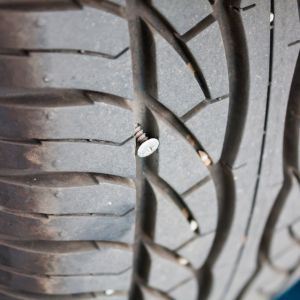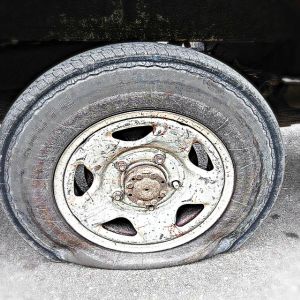Disposal of tyre punctures is necessary because they can no longer be safely used on vehicles and can pose a hazard if left lying around. However, the disposal of tyres can also be harmful to the environment if not done properly. Tyres can release harmful chemicals into the soil and water, and can also be a breeding ground for mosquitoes and other pests.
It’s important to properly recycle or dispose of tyres to minimize the potential negative impacts on the environment. In addition, a tyre punctures can exacerbate the environmental risks associated with improper disposal, as the damaged tyres may leak toxic substances into the surrounding ecosystem if not handled appropriately.
What is the environmental impact of tyre punctures?

Tyre punctures can have a negative impact on the environment in several ways:
- Air pollution: When a tyre is punctured, it can cause the tyre to lose air rapidly. This can lead to increased fuel consumption and air pollution due to the vehicle’s engine having to work harder.
- Ground pollution: When a tyre is punctured, it can release chemicals and other pollutants into the ground. These chemicals can be harmful to the environment and can contaminate the soil and groundwater.
- Noise pollution: A punctured tyre can cause a vehicle to make more noise as it travels, which can lead to increased noise pollution.
- Reduced tyre life: A punctured tyre can be damaged beyond repair, and this would lead to new tyre production which in turn can cause pollution from the production process.
- Risk of accidents: A punctured tyre can make a vehicle more difficult to control, which can increase the risk of accidents. These accidents can lead to further pollution and damage to the environment.
- Discarded tyres: When a tyre is punctured and can no longer be used, it becomes waste. Discarded tyres can take up a lot of space in landfills, and they can also be a fire hazard.
- Incineration of tyres: The incineration of tyres produces toxic fumes and ash that can be harmful to human health and the environment.
Environmental impact of disposal of a tyre punctures

The disposal of tyre punctures can have several negative impacts on the environment:
- Landfill space: Punctured tyres can take up a lot of space in landfills, which can lead to the depletion of natural resources and increased pressure on the environment.
- Pollution: Discarded tyres can release chemicals and pollutants into the environment, which can contaminate the soil and groundwater.
- Fire hazard: Discarded tyres can be a fire hazard, which can lead to damage to the environment and human health.
- Breeding grounds for pests: Discarded tyres can provide a breeding ground for mosquitoes, rodents, and other pests, which can lead to increased health risks.
- Greenhouse gas emissions: When tyres are sent to landfills, they can release methane, a potent greenhouse gas, as they decompose.
- Lack of recycling: If punctured tyres are not properly recycled, they will end up in landfills, where they can take hundreds of years to decompose.
The environmentally friendly way to dispose of used tyre punctures

There are several ways to dispose of used tyre punctures in an environmentally friendly manner. These include:
- Recycling: Tyres can be recycled into a variety of products, such as rubber mulch for landscaping, rubberized asphalt, and playground surfaces. This not only reduces the amount of waste in landfills but also provides a beneficial use for the material.
- Incineration: Tyres can be burned for fuel in specially designed incinerators. This process reduces the volume of tyres and generates energy, but can also produce harmful emissions if not properly controlled.
- Retreading: Worn tyres can be retreaded, which involves removing the worn tread and replacing it with new rubber. This extends the life of the tyre and reduces the need for new tyres to be manufactured.
- Civil Engineering Applications: Tyres can be used as a substitute for traditional materials such as sand, gravel, and stone in various civil engineering projects, such as road construction, embankments, and retaining walls.
- Underground Burial: Tyres can be buried underground, either in a landfill or in a specially designed-tyre storage facility. This method is not as environmentally friendly as recycling, but it does keep tyres out of the environment.
Rubber Tyre: A Biodegradable Waste
Rubber tyres are not considered biodegradable waste. Biodegradable waste is defined as organic material that can be broken down, decomposed and returned to the environment by natural processes. Rubber tyres are made of synthetic materials, such as rubber, steel, and various chemicals, that do not break down easily in the natural environment.
The process of decomposing rubber tyres can take decades or even centuries, depending on the conditions. Tyres can break down into smaller pieces over time, but the synthetic materials that make up the tyres do not break down. In addition, tyres can release harmful chemicals into the soil and water, which can have negative impacts on the environment.
When tyres are placed in a landfill, they do not break down quickly and may release harmful chemicals into the air, soil and water. Tyres can also pose a fire hazard when stored in large numbers. It’s important to properly recycle or dispose of tyres.
Frequently Asked Questions
Q1. What are the problems associated with waste tyres?
Ans: Problems associated with waste tyres include potential fire hazards, breeding grounds for mosquitoes and pests, and difficulty in the disposal.
Q2. Is rubber tyre a biodegradable waste?
Ans: Rubber tyres are not biodegradable, which means they do not break down naturally in the environment.
Q3. Are car tyres bad for the environment?
Ans: Car tyres can have a negative impact on the environment due to their non-biodegradable nature and the chemicals used in their production and disposal.
Q4. What is the environmentally friendly way to dispose of used tyres?
Ans: Environmentally friendly ways to dispose of used tyres include recycling them into new products, using them as fuel in cement kilns or power plants, and using them in construction projects such as creating artificial reefs.

